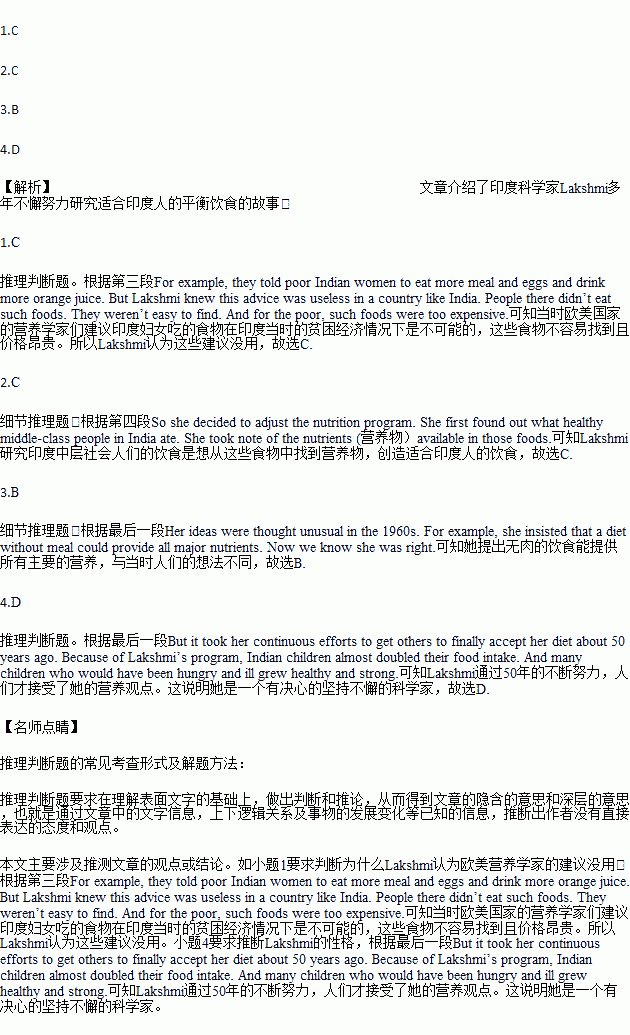题目内容
Lakshmi grew up in India in the first half of the twentieth century, seeing many people around her who did not get enough food, were often sick and died young.
In the 1960s, was asked to help manage a program to improve nutrition in her country. At that time, most advice on nutrition came from North American and European countries. Nutritionists suggested foods that were common and worked well for people who lived in these nations.
For example, they told poor Indian women to eat more meal and eggs and drink more orange juice. But Lakshmi knew this advice was useless in a country like India. People there didn’t eat such foods. They weren’t easy to find. And for the poor, such foods were too expensive.
Lakshmi knew that for the program to work, it had to fit Indian culture. So she decided to adjust the nutrition program. She first found out what healthy middle-class people in India ate. She took note of the nutrients (营养物)available in those foods. Then she looked for cheap, easy-to-find foods that would provide the same nutrients.
She created a balanced diet of locally grown fruits, vegetables, and grains. These foods were cheap and could be cooked with simple equipment. Her ideas were thought unusual in the 1960s. For example, she insisted that a diet without meal could provide all major nutrients. Now we know she was right. But it took her continuous efforts to get others to finally accept her diet about 50 years ago. Because of Lakshmi’s program, Indian children almost doubled their food intake. And many children who would have been hungry and ill grew healthy and strong.
1.Why did Lakshmi think European nutritionists’ advice was useless?
A. It worked well for European people.
B. It suggested too many foods for Indians.
C. It was not practical in India at that time.
D. It included foods that didn’t exist in India.
2.Lakshmi studied healthy middle-class people’s diet in order to .
A. know about their eating habits B. learn about Indian culture
C. find out nutrients in their food D. write a report on food nutrients
3.Lakshmi’s balanced diet was considered unusual because people thought .
A. those foods were too cheap B. it should include some meat
C. it provided all major nutrients D. it enabled kids to grow healthy
4.What can we infer about Lakshmi?
A. She came from a rich family.
B. She disliked middle-class people.
C. She worked with European nutritionists.
D. She was a determined scientist.
假定你是李华,你对本班50个学生进行了健康问题的问卷调査。请给你的班主任兼英语老师Jack写一封电子邮件,告知调査的结果和自己的建议。内容主要包括:
1.依据表格内容,综述学生当前存在的健康问题;
2.就中学生如何保持身心健康提出自己的建议。
注意:1.词数100左右;
2.可适当增加细节,以使行文连贯。
问题类型 | 学习焦虑 | 睡眠不足 | 缺乏锻炼 | 视力不佳 |
人数 | 35 | 40 | 25 | 35 |
比例 | 70% | 80% | 50% | 70% |
Protection Publications
Consume Health: A Guide To Intelligent Decisions Eight softcover edition of leading college text covering all aspects of basic health strategy for consumers. This new edition of the most comprehensive text available in the field continues to provide a vast amount of information to enable consumers to make wise choices regarding health products and services. By Stephen Barrett. 608 pages, $23.00 |
Chiropractic(手疗法): The Greatest False Warning Of The Century? L. A. Chotkowski describes discoveries made during his half-century of medical practice. It includes reports of cases; the author’s observations at New Chiropractic College, a chiropractic office, and a chiropractic lecture; and details of critical reports in the media. Second edition, softcover, 209 pages, $15. |
The Whole Tooth The fundamental guide to protecting your dental health and your pocketbook. It covers preventive care, finding a good dentist, dental restoring, cosmetic dentistry, dental quackery(治疗)and fraud(假牙),and dental insurance programs, including managed care. By Marvin J. Schissel, and John E. Dodes. Softcovr, 284 pages, $10. |
Quackery And You The 32-page softcover brochure with special viewpoints by William Jarvis, Ph. D. , suitable for waiting rooms. $1. |
To above prices, please add $3 for the first book and $1 for each additional book for postage & handing. Foreign countries add $5 per book. Send orders to Quackwatch, P. O. Box 1747, Allen Avenue, NY 18105. The checks must be in US dollars. We cannot process credit card orders. Please use our order form from amazon.com and you can get more information from it.
1.A Canadian wants to buy all the four books and he should pay__________.
A. $69 in all B. $49 in total
C. by credit card D. in Canadian dollars
2.From the text, we learn that______________.
A. The means of cover packing of the books are different
B. Quackery and You is designed for those waiting to see the doctor
C. Consumer Health includes much information on critical reports
D. L. A. Chotkowski provides you with all of your dental needs
3.What can you do to search for more information about the books?
A. Buy the brochure B. Write to the author
C. Telephone the sellers D. Visit amazon.com

